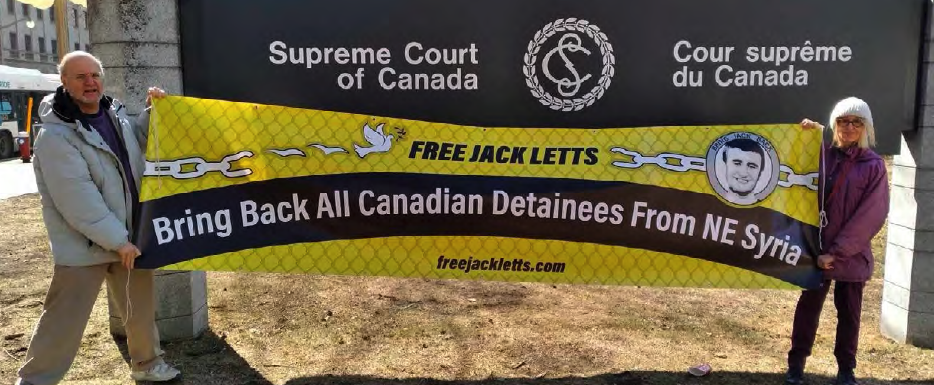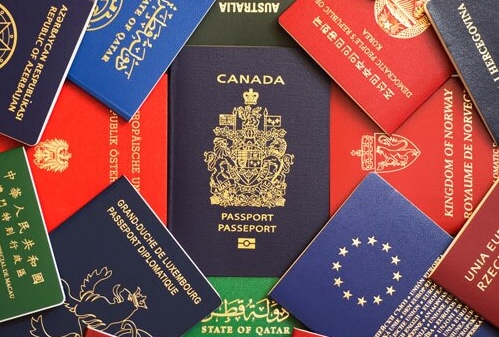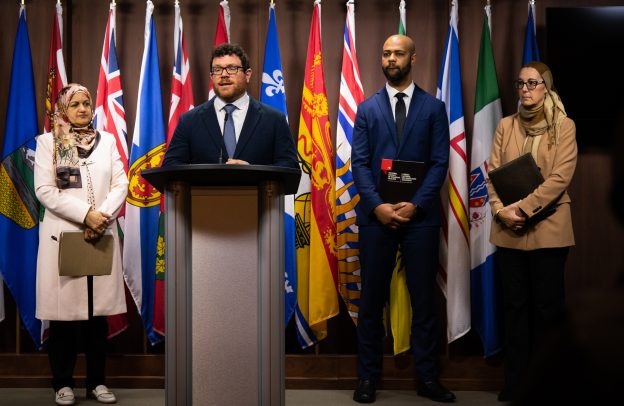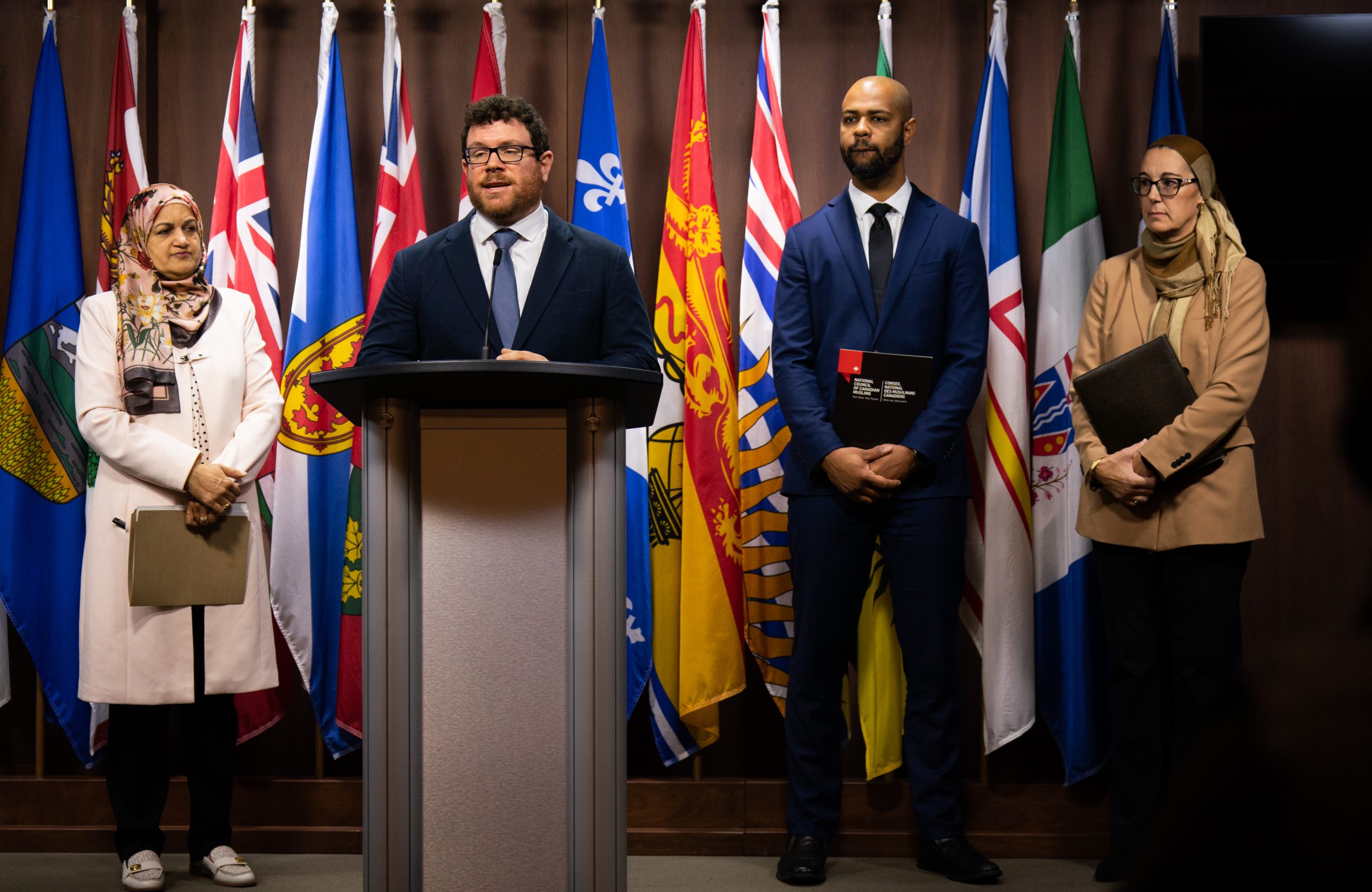
Jack Letts’ mother, Sally Lane, and social justice advocate Matthew Behrens at the Supreme Court of Canada. Credit: Free Jack Letts
By Justin Mohammed
For the past four years, dozens of Canadian citizens – about half of whom are children – have been arbitrarily detained in Northeast Syria. Most have been living in squalid camps, in conditions that the United Nations Special Rapporteur on the promotion and protection of human rights and fundamental freedoms while countering terrorism has found to constitute torture, cruel, inhuman, and degrading treatment or punishment. Their plight has, until very recently, gone under the radar of the Canadian public, media and political leaders. In stark contrast to others, such as Michael Kovrig and Michael Spavor who have become household names due to the laudable efforts of the Government of Canada to bring them home from China, the Canadians detained in Northeast Syria have been stonewalled with a multitude of justifications about why Canada cannot repatriate them.
From the moment that the ICLMG became aware of this situation, it has steadfastly stood up for the human rights of these citizens. In 2019, a coalition of academics, civil society organizations, and lawyers were convened to discuss how this situation could be addressed, with the ICLMG playing an active role in those conversations. After a year of government advocacy, gathering information from the detainees’ relatives, and strategizing on ways to pressure the government into action, this coalition pushed the issue squarely into the public arena in January 2020, writing to Prime Minister Justin Trudeau and demanding that he take action on behalf of these citizens. Human Rights Watch followed up with a landmark report on the Canadian detainees in June 2020, providing a springboard for the ICLMG and others to continue advocacy on these cases. In the first half of 2021, both the House of Commons Foreign Affairs Committee and the Subcommittee on International Human Rights held hearings on the topic, during which Amnesty International, Save the Children, Human Rights Watch and others testified about the pressing need for action.
The first breakthrough came in October 2020, when a five- year-old orphaned girl was finally repatriated to Canada, and since then the ICLMG has played a leading role in sustaining the pressure on the Government of Canada. It spoke out against the secretive consular policy created by Global Affairs Canada that established an entirely separate framework for Canadians detained in Northeast Syria, and in June 2022, the ICLMG hosted a webinar highlighting the parallels of the Canadian detainees’ situation with the unlawful detention carried out by the United States at Guantanamo Bay. Since then, a number of the Canadian detainees have been able to return but many remain trapped in Northeast Syria.
With limited action from the Canadian government, in December 2022, lawyers Lawrence Greenspon and Barbara Jackman took the case of the Canadian detainees to the Federal Court of Canada, seeking to force the government into action. Regrettably, the Government of Canada continues to deny that it has any legal responsibility towards this group of Canadians, despite holding the very keys that would put an end to the human rights violations they are suffering on a daily basis. This intransigence indicates that the lessons of commissions and reports of the past, such as the Arar Inquiry, the Iacobucci Inquiry, and the 2018 Auditor General’s report on consular services, have not yet been learned. The scandalous treatment of the Canadians detained in Syria is sadly destined to be the next chapter in this shameful history.
Justin Mohammed is the former Program Manager (Campaigns & Advocacy) at Amnesty International Canada, and a former representative for Amnesty on the ICLMG steering committee.
Canada: Bring Them Home!By Xan Dagenais On January 20, 2023, Federal Court Justice Henry Brown ruled that Canada must repatriate Canadians illegally and arbitrarily detained in Northeast Syria in conditions United Nations officials have found to be akin to torture. Brown wrote that the government was in breach of section 6 of the Canadian Charter of Rights and Freedoms – guaranteeing all Canadians the right to enter, remain in, and exit Canada – and must act “as soon as reasonably possible” to bring Canadians home. Since then, the government has repatriated several Canadian women and children, but not all Canadians. The Canadian government filed an appeal and, disappointingly, the Federal Court of Appeal overturned the lower court’s decision. The families of the Canadians left behind have recently asked the Supreme Court to reconsider its shocking decision not to hear their appeal and play its role as a guarantor of rights and justice, as the government is not doing so of its own accord. The government continues to have no justification to refuse to repatriate all detained Canadians. It does not allege any of them engaged in or assisted in terrorist activities, and Justice Brown saw no evidence that any detainee had committed offenses contrary to Canadian law. It remains crucial to send the government a strong message to act quickly. Every day the government fails to bring home these Canadians, it places their lives at risk from disease, malnutrition, violence, and ongoing armed conflicts, including bombing by Turkey’s military. Please take action and share widely: iclmg.ca/repatriate-all-canadians Xan Dagenais is the Communications and Research Coordinator of the International Civil Liberties Monitoring Group |
Since you’re here…… we have a small favour to ask. Here at ICLMG, we are working very hard to protect and promote human rights and civil liberties in the context of the so-called “war on terror” in Canada. We do not receive any financial support from any federal, provincial or municipal governments or political parties. You can become our patron on Patreon and get rewards in exchange for your support. You can give as little as $1/month (that’s only $12/year!) and you can unsubscribe at any time. Any donations will go a long way to support our work. |





